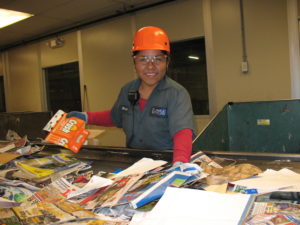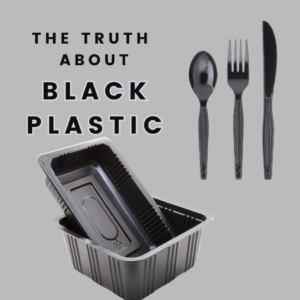On Thursday, June 30th, Eureka Co-President and National Coordinator for AMBR Lynn Hoffman was invited as one of six experts to testify before the Subcommittee on Environment and Climate Change of the Committee on Energy and Commerce at legislative hearing entitled, “No Time to Waste: Solutions for America’s Broken Recycling System.” The four pieces of legislation in review for this session are:
- H.R. 8059, the “Recycling and Composting Accountability Act”
- H.R. 8183, the “Recycling Infrastructure and Accessibility Act of 2022”
- H.R. 1512, the “Climate Leadership and Environmental Action for our Nation’s Future Act” or the “CLEAN Future Act”
- H.R. 2238, the “Break Free From Plastic Pollution Act of 2021”
Watch the full hearing HERE and/or read remarks below. Eureka Co-President Lynn Hoffman begins testimony at the 35 minute and 36 second (35.36) mark
“Chairman Tonko, Ranking Member McKinley, and members of the subcommittee, thank you for your time, attention, and leadership on this important issue.
I am one of the co-presidents of Eureka Recycling and the National Coordinator for the Alliance of Mission Based Recyclers. Eureka Recycling is a social enterprise recycler based in the Twin Cities of Saint Paul and Minneapolis in MN. Our mission is to demonstrate that waste is completely preventable. We employ 120 amazing people with living-wage jobs who collect, sort, and market 110,000 tons of residential recycling every year. Holding the two largest recycling contracts in the state, we have an annual operating budget of $20 million. Our union drivers pick up recycling from more than 130,000 households in St Paul and surrounding communities. Those recyclables get added to material from many other communities at our Material Recovery Facility (or MRF), where our team sorts them into up to 15 different commodities to sell to manufacturers.
We are the boots on the ground making recycling work each and every day. We strategically work at the community level and leverage our experience towards broader advocacy and systems change, holding a clear and bold vision for a world without waste while we wrestle with the day-to-day challenges facing recycling today. Amid historic supply chain disruptions, the intensifying climate crisis, and rampant plastic pollution, there has never been a more important time to adopt new policies to scale up and modernize our recycling system.
Recycling has a well-deserved reputation for being an environmental action that individuals and communities can take. It is a critical and effective tool for reducing waste and lessening the impacts of consumption. It has the potential to help stabilize the climate, preserve critical ecosystems, protect human health, mitigate the inequitable impacts of waste and extraction on marginalized communities, and support resilient regional economies and good green jobs (GAIA, 2021). However, like any tool in the toolbox, in order to apply it in the most effective way, it is important to understand how recycling works, its limitations, and how effective policy and sound infrastructure can leverage and enhance its impact.
- Recyclers are manufacturers. We are not waste management facilities. We take a specific set of products that are designed to be recycled, sort them into standardized mixes of materials and create high-quality, consistent, valuable, regulated global commodities that we feed into the supply chain to be made into new products. Improving recycling improves the resilience and stability of our economy. We’re seeing unprecedented disruptions in global supply chains and increasing demand for recycled materials. My brother runs a small brewery in Minneapolis, and I often hear about how the global aluminum shortage is negatively affecting his industry. And yet, more than 62% of all aluminum cans sold in the United States are ending up in landfills or incinerators (Ball, 2021). We have the knowledge and proven solutions to create a dependable regional supply of valuable commodities that will strengthen domestic businesses.
- Recycling needs more than dollars to scale and improve. The Infrastructure Investment and Jobs Act will provide $275 million in much-needed grant funding for waste and recycling infrastructure and $75 million for education grants. More than 40% of people living in the US don’t have adequate access to recycling services (Recycling Partnership, 2021), and these grants can start to close that gap and capture some of those unnecessarily wasted cans. However, in order to make sure our investments are strategic and successful, we need to support recycling with complimentary and practical policy solutions, like those laid out in the Break Free From Plastic Pollution Act. Recycled content mandates, a thoughtfully-designed national container deposit system, labeling and design standards for packaging, incentives and targets for reuse and reduction, and bans on the most problematic and unnecessary materials are essential policies that will help make recycling more efficient and effective. A key provision in two of the bills under your consideration is a national Extended Producer Responsibility system, or EPR system. At Eureka Recycling, we must make multi-million dollar investments into equipment upgrades every couple of years just to keep up with the changing and evolving composition of packaging and products we receive —especially the ever-increasing amount of plastic—which further increases the costs of recycling programs for communities. AND we are just one of more than 350 MRFs making these investments in our infrastructure across the country! As it stands today, producers of packaging have no skin in the game when it comes to the end of life of the products and packaging they create. A strong EPR system would transform the way we fund and improve recycling systems across this country and shift the burden away from the taxpayers by requiring producers to design their products to fit into existing systems and support the necessary infrastructure.
- Recycling is not enough. Recycling is a solution for products and packaging that are designed to be recyclable. Our attention needs to be focused on improving the capture and circular recycling of the materials that work in the current system. As an example, #1 PET single-use plastic water and soda bottles are one of the few plastic packaging types that are easy to sort and have strong markets, yet less than 30% of PET bottles are captured for recycling (EPA, 2021). This is low hanging fruit. Now, compare that to other types of plastic packaging in our trash that have little or no value, no end markets, and have major challenges to collect and sort, include #6 polystyrene, #3 PVC, black plastic, and plastic film. Putting money into trying to make problematic packaging recyclable is squeezing at the wrong end of the tube. Rather, we must invest in capturing the millions of tons of wasted material that we know how to recycle and is in high demand as domestic feedstock. For the myriad other non-recyclable, single-use packaging that is currently in our lives, recycling is not a viable or effective solution. Reduction, redesign, and reuse are the most strategic and effective strategies to apply to these wasteful products that were never designed to be recycled in the first place. In short, to build out an effective and efficient recycling system, we have to do all we can to standardize the packaging stream and eliminate the most problematic and unnecessary materials and formats.
- Recycling needs focused innovation, not distractions. We have invested in and continue to explore robotics, optical sorters, artificial intelligence, and other emerging technologies to advance our mission and improve our operations at Eureka. We are excited about the rapid advancement of technology helping to improve the quality of the materials at our MRF, make the working environment safer for our team, give us better data for process improvement, and increase transparency. However, technology is not going to solve the big problems, especially when it comes to plastics. Companies want to sell so-called “chemical recycling” or “advanced recycling” schemes as a way to take a lot of low-value, problematic, and unnecessary plastics and somehow produce a marketable product. That idea has been around for 40 years, and it has not been proven economically, logistically, or technologically feasible. These companies misuse the term “recycling” to greenwash the process of converting mixed plastic waste into fuel, typically through pyrolysis or gasification. Superheating plastic into a fuel to be combusted does not keep those resources in the supply chain as part of a circular economy. Please be wary of false solutions like “chemical recycling”, “advanced recycling”, or “waste-to-energy”, none of which fit the definition of actual recycling and have no place in a circular economy. We can’t be distracted and waste our time and money on strategies that are unproven, unlikely to scale, and leave many concerns about toxicity and environmental and human health impacts unaddressed (AMBR, 2022). Linear consumption, whether it’s waste-to-energy or plastics-to-fuel, is not recycling, and we must not allow wasting to be incentivized under the guise of any real, circular solutions.
- The time to act is now. Historic supply chain disruptions. Rampant climate change. Global plastic pollution. Environmental injustice. Recycling is a tangible everyday action that allows all Americans to be part of the solution. As Members of Congress, you are asked to make a lot of difficult decisions every day. This isn’t one of them. Waste reduction and recycling is a win-win-win for our environment, our economy, and our health. The Break Free From Plastic Pollution Act represents a game-changing policy opportunity to transform recycling without massive federal spending. As the U.S. steps into a lead negotiating role for the fast-moving process to develop a Global Plastics Treaty as part of the United Nations mandate (CIEL, 2022), Congress should not miss this opportunity to pass the Break Free From Plastic Pollution Act as a model blueprint for national action. Eureka and our allies in the Alliance of Mission Based Recyclers are engaged with stakeholders across the supply chain, from the US Plastics Pact to community advocates to direct conversations with consumer brands and packaging companies, and there is widespread agreement that we need EPR. It is time for policy incentives and solutions to help rapidly secure a more stable, equitable, healthy, and resilient future.
Thank you for the opportunity to share our experience from Eureka Recycling and the Alliance of Mission Based Recyclers with you as a part of this process, and I look forward to your questions.”
Share this Story

Tour Eureka Recycling’s Upgraded Facility on May 31!
Ever wondered what happens to your recyclables after they leave your curb? Join us at Eureka Recycling’s Community Tour Day

Eureka Recycling Celebrates 20 Years and Facility Upgrade
This Earth Day, we are proud to celebrate two major milestones:two decades of pioneering mission-driven materials processing and the launch

Ditching Black Plastic
Black plastics are bad news. They’re toxic, and they’re not recyclable. So why are we still using them for

We Need Action on Electronic Waste
Residents across Minnesota need free and equitable access to electronics and battery recycling. Take Action Now. Legislation enacted in 2007
